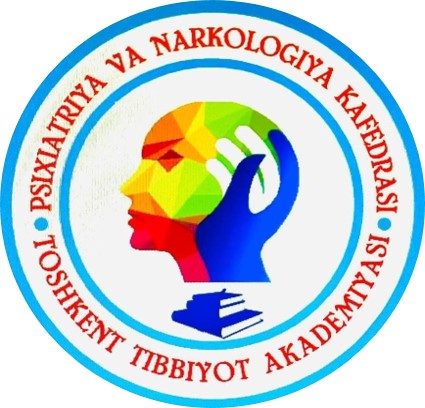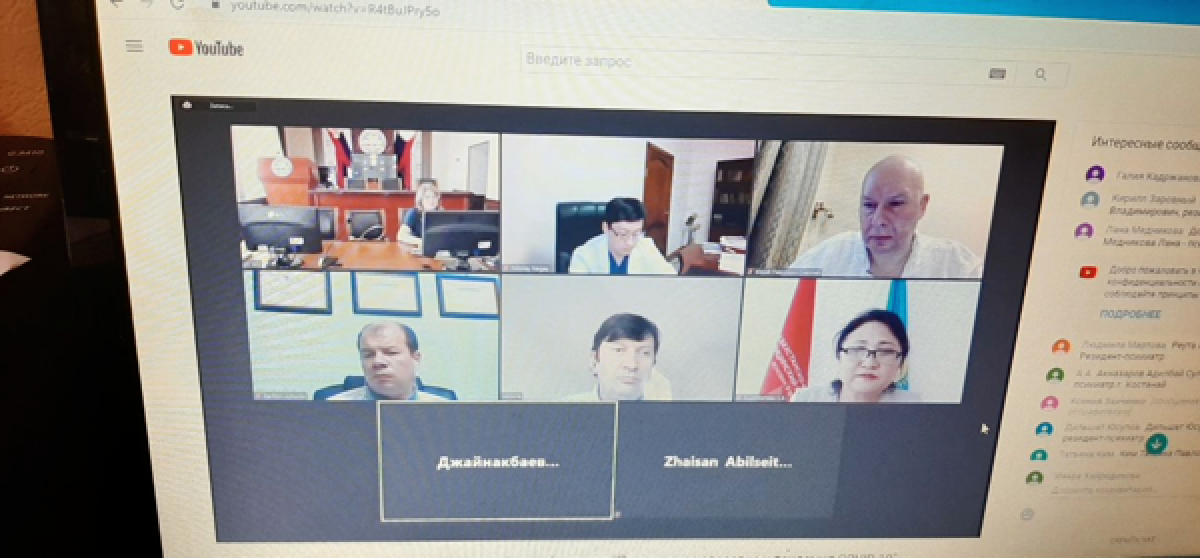Resolution of the President of the Republic of Uzbekistan dated 20.04.2017 No 2909 “On measures to further develop the system of higher education”, 16.03.2018 No 3606 “On measures to radically improve the system of psychiatric care” In accordance with the Resolution of the Government of the Republic of Uzbekistan dated February 13, 2019 No. 4190 “On approval of the Concept of development of mental health protection of the population of the Republic of Uzbekistan for 2019-2025” Tashkent Medical Academy in cooperation with the Kazakh-Russian Medical University (Kazakhstan) for TTA professors, masters and residents and other medical professionals in the field of psychiatry with international participation “Old and new problems of psychiatry during the COVID-19 pandemic” organized an online scientific-practical conference. The online conference was held on June 24, 2020 via Youtube and Zoom.
Speakers: leading local and foreign experts in the field of psychiatry
“Mental health and the pandemic of COVID-19” Eshimbetova Saida Zakirovna – – Ph.D., Professor, Head of the Department of Psychiatry, Narcology and Neurology of the Kazakh-Russian Medical University (Kazakhstan)
“Changing approaches to mental health care in the context of the spread of the COVID-19 pandemic” Negay Nikolai Anatolyevich – Ph.D., Professor of Psychiatry and Narcology, Kazakh National Medical University named after SD Asfendiyarov (Kazakhstan).
“Psychological state of doctors and mental state of doctors during and after the pandemic” Yuri Pavlovich Sivolap – Ph.D., Professor of the Department of Psychiatry and Addiction of the First Moscow State Medical University (RF) named after IS Sechenov
“Psychosomatic and somatoform disorders in the context of the COVID-19 pandemic” Mollaeva Naida Rajabovna – Vice-Rector for Research, Head of the Department of Psychiatry, Narcology and Medical Psychology, Dagestan State Medical University (RF)
“Optimization of psychiatric services in a pandemic on the example of a single region” Mazgutov Abdulla Velievich – Associate Professor of the Royal College of Psychiatrists (England)
“The impact of the COVID-19 pandemic on the mental state of the Czech population” Aliyev Akmal Nurillaevich – Researcher of the Department of Social Psychiatry of the National Institute of Mental Health (Czech Republic)
“Is there a crisis in mental health after the pandemic and quarantine of COVID-19” Ashurov Zarifjon Sharifovich – Ph.D., Head of the Department of Psychiatry and Narcology, TTA, (Uzbekistan)
“COVID-19 pandemic and mental health of children and adolescents” Abdullaeva Vasila Karimbekovna – Ph.D., Head of the Department of Psychiatry, Narcology, Child Psychiatry, Medical Psychology and Psychotherapy of the Tashkent Pediatric Medical Institute (Uzbekistan).
The main goal of the conference is to disseminate advanced knowledge on the issue of mental illness, to improve the interaction of physicians of different specialties in helping patients and physicians with mental illness during the COVID-19 pandemic. ”
The main directions of the conference:
People’s reactions during a pandemic: stress, anxiety, depression, rejection, anger, and fear. What else?
Prophylactic actions
Should we expect “mental epidemics” in the next period of the coronavirus pandemic?
Pandemics and the mental health of children and adolescents
The Global Crisis of Psychiatric Care
Project chairmen:
Eshimbetova Saida Zokirovna – Doctor of Technical Sciences, Professor, Head of the Department of Psychiatry, Narcology and Neurology, Kazakh-Russian Medical University (Kazakhstan)
Ashurov Zarifjon Sharifovich, Ph.D., Associate Professor, Head of the Department of Psychiatry and Narcology of the Tashkent Medical Academy, President of the Association of Psychiatrists of Uzbekistan
Format: presentation (30 min.) With subsequent discussion.
On June 24, 2020 at 11:00 a video conference started, where the congratulations of the Rector of the Kazakh-Russian Medical University, Ph.D., Professor Djanakbaev Nurlan Temirbekovich were heard.
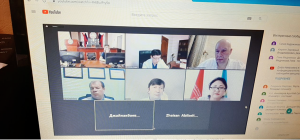
Then, at 11:15, the speaker Eshimbetova Saida Zokirovna gave a speech to the first speaker Negay Nikolai Anatolevich on the topic “Changing attitudes to mental health care in the context of the spread of the COVID-19 pandemic.” fasted.
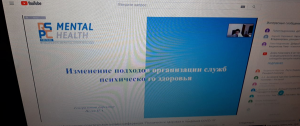

Mental health and psycho-social care services should be based on existing local conditions. There is no single approach to mental health and psychological and social support measures in all countries where the spread of the virus has been reported. RSPSQ services should be tailored to the needs of children and the elderly, the disabled and other vulnerable groups. In order to be effective in dangerous diseases such as COVID-19 and not lead to gender inequality, gender norms, roles, and attitudes that affect the vulnerability of women and men to infection, pathogens, and treatments received must be taken into account. may vary between.
At 12.00 Sivolap gave a speech to Yuri Pavlovich on “The psychological state of doctors and the mental state of doctors during and after the pandemic.”

Physicians, nurses, ambulance drivers, medical registrars, and other professionals who provide direct care to COVID-19 victims may be exposed to additional stressors: 1) Stigmatization associated with those working with COVID-19 and their remains ; 2) strict measures of biological safety: – physical stress from protective equipment; – physical isolation, which reduces the level of comfort for the sick or distressed; – constant responsibility and stress; – adherence to strict procedures that exclude spontaneity and autonomy; 3) increase in workplace requirements, including the length of the working day, an increase in the number of patients; 4) the need to monitor the latest data on COVID-19; 5) reduced access to social assistance due to working hours and stigmatization; 6) lack of personal resources or opportunities for personal care, especially among people with disabilities; 7) lack of information on its duration in people with COVID-19; 8) Fear of contracting COVID-19 with relatives and friends.
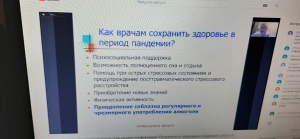
At 12:45 the speaker Mollaeva Naida Rajabovna was given a speech on “Psychosomatic and somatoform disorders in the context of the COVID-19 pandemic.”
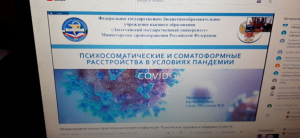
During the pandemic, certain negative dynamics were noted in relation to somatic diseases, in which the psychosomatic or psychogenic mechanism plays an important etiopathogenetic role. The main clinical manifestations of somatic disease are recurrent and often mutated somatic symptoms that usually occur over several years. Symptoms can affect any system or organ, but the most common are gastrointestinal tract sensations (pain, stuttering, regurgitation, vomiting, nausea, etc.), as well as skin sensitivity (itching, burning). etc.). Complaints about sexually transmitted diseases and menstrual disorders are common. Depression and anxiety are often found to be manifestations. The disease is chronic and remitting, often accompanied by long-term disruption of social, interpersonal, and family relationships.
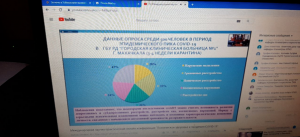
At 13.20 the floor was given to the speaker Mazgutov Abdulla Velievich, who spoke about the activities of the health care system and psychiatric services during the pandemic in England.


At 13:50 Aliyev Akmal Nurillaevich’s report on the social psychiatric service in the Czech Republic “The impact of the COVID-19 pandemic on the mental state of the population of the Czech Republic” began.

At 14:20 Eshimbetova Saida Zokirovna’s lecture “Mental health and pandemic COVID-19” began.
Emergencies always cause stress, but there are specific stress factors in the spread of COVID-19 that affect the population. These stressors include:
The risk of self-infection and transmission to other people, especially if the method of transmission of COVID-19 virus is not 100% understood.
Common symptoms of other health problems (e.g., fever) can be mistaken for COVID-19, and this can lead to fear of infection.
Adults can worry about children because of the closure of schools left without proper supervision and support at home. The closure of schools can have different consequences for women, providing much of the informal support in families. This applies to time constraints and, accordingly, economic opportunities.
Vulnerable people are at risk of deteriorating physical and mental health if their guardianship is quarantined and other forms of support are not available.
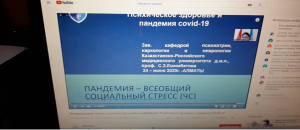
At 14.45, the head of the Department of Psychiatry and Addiction of TTA Ashurov Zarifjon Sharifovich was given the floor with a report “Is there a crisis in the mental health service after the pandemic and quarantine of COVID-19?”

The impact of the Covid-19 crisis on mental health is already being felt. One study examined the mental health of more than 44,000 people in Belgium after a month-long quarantine based on a survey. Anxiety (20%) and depressive (16%) disorders increased significantly compared to 2018 (11% and 10%, respectively). The most affected were women and young people aged 16 to 24 years. Increases the risk of direct and indirect anxiety and depressive disorder with a person who is suspected or ill with Covid-19. However, there are protective factors such as the presence of loved ones and professional activity.

At 15:35 Abdullaeva Vasila Karimbekovna was informed about the “COVID-19 pandemic and the mental health of children and adolescents.”

The risk of infection and the fear of infection are forcing millions of people in different countries to follow the rules of social distance and self-isolation recommended by the World Health Organization. The stress caused by the risk of illness and death is exacerbated by inevitable restrictions and lifestyle changes. In such a situation, families with children experience a certain burden because the usual stereotypes are shattered and the satisfaction of the age-related needs of children and adolescents is largely limited. In order to maintain the mental health of children and provide favorable conditions for their development, parents should take certain measures to properly regulate the situation and organize family life and relationships in the new conditions. They can be supported and assisted by expert advice.

Conclusion at 16.10.
After that, the conference organizers thanked the leading experts who took the time and shared their knowledge and rich experience, as well as thanked all the participants for their attention and hoped for further active cooperation with local and foreign colleagues. reported.
The video conference ended at 4:20 p.m.
The duration of the online conference is 4 hours
Number of active participants – 143
